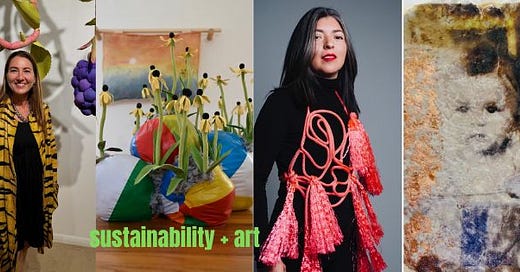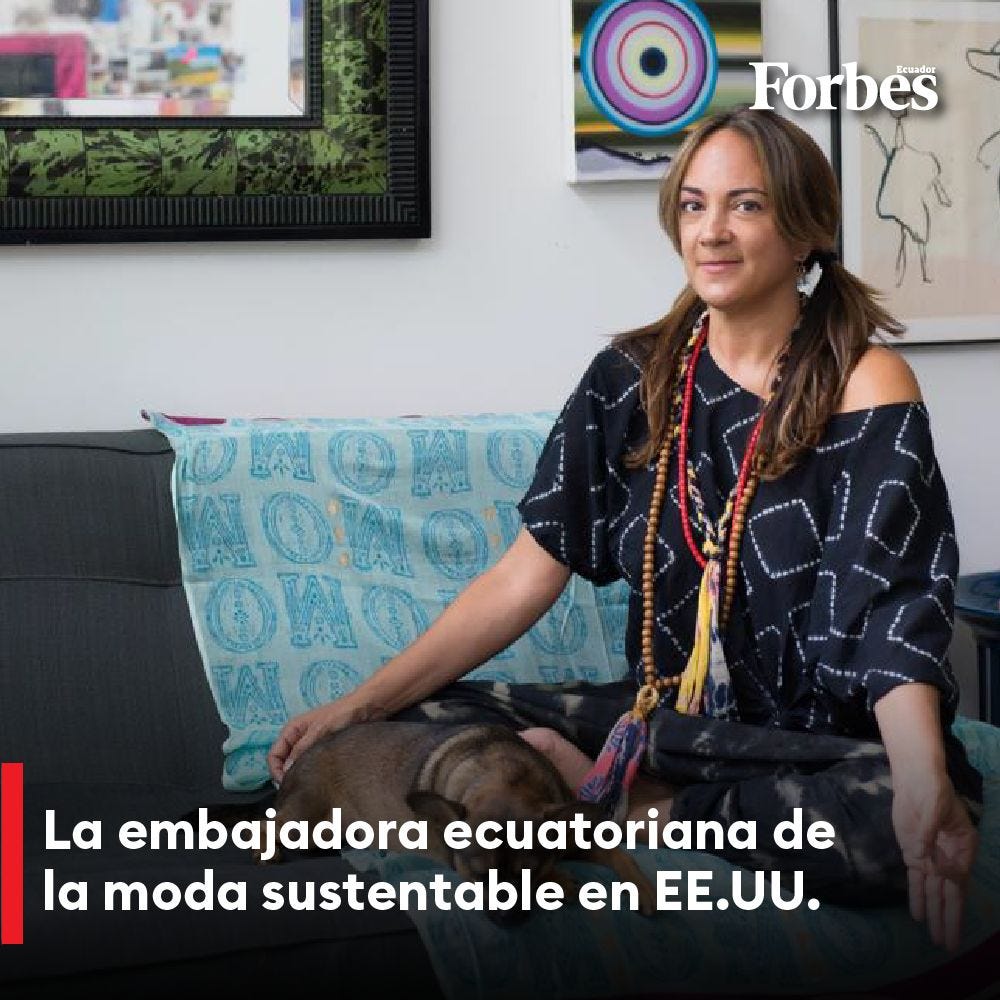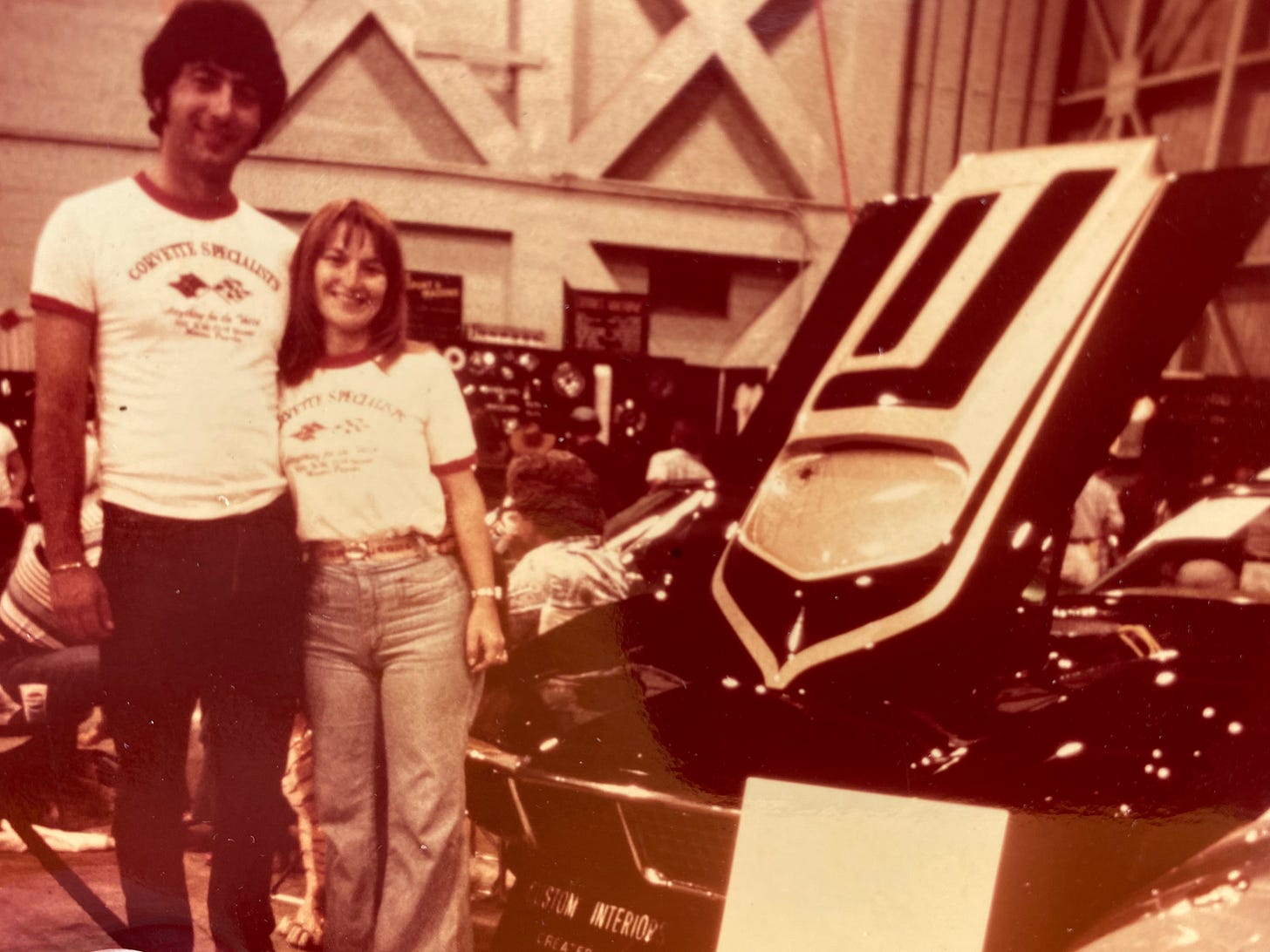art, waste, sustainability & the need to slow down
The revolutionary art of Alissa Alonso & Lisu Vega
Hello reader,
As you may or may not know, until recently I was a sustainable fashion entrepreneur and activist. At the end of my years in this space (I actually started my first “sustainable” brand Vero Santes in 2000 before the term existed) I grew increasingly disdainful of the “sustainability” discourse, given that toxic companies like Shien and Forever 21 started mass marketing their (cough cough) “sustainable” wares, that was my cue to exit stage left as it were. The lack of regulation left me feeling like that term could not really coexist with the fashion system as it currently operates (more on this later.) It is estimated that there are between 80 and 150 billion new garments made each year. There is nothing sustainable about that level of over production, but something equally disturbing to me about textile waste is how it replicates colonial patterns of exploitation. The ole “West devours the Rest and makes a profit” paradigm...
Waste colonization is a term coined in 1989 to describe this cycle of abuse, more specifically the dumping of hazardous waste (including most of the “donated” items we give to charity) by the Global North to low GDP countries in the Global South. The global waste trade is projected to be a $2.3 trillion USD market by 2027. (As an example, the staggering amount of textile waste in the US has doubled since 2000)
Donating to charity is often heralded as a #greenwashing solution to the West’s over consumption problem when in reality disposing of textiles to counties like Africa is straight up waste colonialism. Let’s take Ghana as an example where the locals refer to the staggering amount of textile waster as obroni wawu or “dead white man’s clothes.” (Read more about this in the Guardian) Here are some grim statistics as to where our “donated” clothing actually ends up:
Because of a lack of funds to transport all the waste to a landfill, clothing gets dumped straight into the ocean.
In addition to floods, clothing waste contributes to blockage of water ways. Bacteria grows!
Second hand clothing waste has become a public health crisis!
Less than 1% of clothing is actually fully recycled, and most of it is made from oil, polyester has become the number one synthetic fiber and now represents more than half of all global fiber production. Tragically it is derived from nonrenewable resources and perpetuates our dependance on fossil fuels.
This is the KANTAMANTO MARKET in Accra, Ghana, the largest secondhand clothing market in West Africa. Fifteen million garments come to the market weekly - unwanted and low quality clothing sent from the 'global north' (aka UK, USA etc) to Ghana. Close to 30,000 people work there six to seven days a week in an attempt to recirculate our global north discards. The Kantamanto market’s textile merchants pay a large price for our unwanted clothing, in fact many go into debt.
During my years as an activist I was fortunate to work alongside anthropologist Sandra Niessen who in my opinion is the leading voice to listen to and study if these matters interest you! This Canadian-Dutch cultural anthropologist and de-Fashion activist also works with Fashion Act Now, another org I collaborated with and recommend. Their mission is “to challenge and transform the values behind our clothing systems,” while calling for Defashion, “a transition to post-fashion clothing systems that are regenerative, local, fair, nurturing and sufficient for the needs of communities.” Here is a great podcast!!
“The Ecuadorian Ambassador of Sustainable Fashion”
Dear reader, I was so immersed in this space that Forbes Ecuador anointed me the Ecuadorian Ambassador or Sustainable Fashion! For this reason when I see the art of women like Lisu Vega and Alissa Alonso I get super excited, they are turning our rampant over consumption into radically beautiful art!
“Slowing down is not a function of speed. It is a function of awareness… It’s a function of presence.”
—Bayo Akomolafe
Artist Alissa Alonso was born and raised in Miami, FL her parents owned a Corvette restoration business for 58 years in the very same neighborhood where she currently has a solo show! It highlights her “Nature’s Medicine” series which she made from hand sewn discarded fabric and repurposed found objects. Using textile remnants, she also hand-dyes fabrics, resulting in fantastical medicinal plants, fungi, and dreamy floral arrangements that sprout from discarded tennis balls and other mundane objects. She sources these bases for each sculpture from beach cleanups where she finds plastic waste.
Ron and Carlotta DeLucia, Alissa’s parents who owned “Corvette Specialists” for over 50 years
This is a bit of a homecoming for this multifaceted artist who is also a vintage collector, a mother of three, and a life-long lover of the outdoors who grew up watching her parents deck out custom Chevy corvettes. (see above)
I remember the first time I met Alissa at a native plant watercolor making workshop, I have been following her career ever since and I am thrilled she is getting a one woman show! Her work (follow her on IG) is made from up cycled, hand-dyed, stuffed fabric, discarded tennis, golf and baseballs, etc. You can see one of her soft-sculpted landscapes in the background of the picture below, for me her work has a dream-like quality, which is why I loved this quote:
“I dream of puffy clouds, idyllic landscapes, and kaleidoscope skies super-enhanced with phytotherapy. I have always embraced a deep connection with the natural world through my art.” -Alissa Alonso
“I believe, as a society, we have lost touch with the environment and the people around us. Our lives are dominated by social media and technology, going from one notification to the next. Instead of experiencing the natural world, we live our lives through our phones. My art provides the opportunity to escape from this unsustainable cycle, to recognize and reflect on the beauties of the natural world as well as the chain of destruction we have set in motion.” -Alissa Alonso
Artist Lisu Vega (b. Miami, FL) was born in Miami, FL, and grew up in Maracaibo, Venezuela. She is a multidisciplinary artist working with engraving, sculpture, installation, and fashion art. Her work explores ideas of sustainability, migration, memory, and identity.
"My artistic journey is deeply rooted in the intricate tapestry of human memory, expressed through weaving. My extensive photographic archive serves as a reservoir of portraits, experiences, and memories that inspire and inform my work.
As I navigate the realms of both physical and digital media, I am able to create a symbiotic relationship between past and present. Most importantly, I honor my grandmothers and the women who came before them; their DNA is woven into each of my pieces." - Lisu Vega
Like Alissa I met Lisu in the sustainable fashion space of Miami back in the day, and I have also been following her artistic journey and I am equally thrilled for her solo show. The work in her exhibit was done as a response to the passing of her beloved Venezuelan grandmother, it is a deeply personal exploration into the past, and the fading memory of home experienced by so many immigrants. It hit home for me as a fellow Latinx immigrant who also learned what “sustainable” truly means by watching my own grandmother make and mend her clothing with a costurera and never waste a single item of food, in fact she held on to a relic of a fridge for over 50 years, refusing to buy a new one. Lisu’s exhibit is a testament to the fading of our past and the need to capture and revel in our collective, ancestral wisdom. The fact that Miami is getting on board with promoting our incredible textile women artist is a win win!
Why did I choose to call their art “revolutionary” in the title of this essay? Because in the age of Amazon-fueled, hyper consumption the act of up-cycling, whether in fashion or in art, is a decolonial, de-westernization of the creative process and I AM HERE FOR IT!
If you are in Miami this Saturday join me as I pick talk to these two fab women: click here for eventbrite
Until later, peace, love and art!!
xo
Vero













Inspiring - as always - and with analogies, I may add, of our upbringing in Quito, Ecuador 🇪🇨 “nada se desperdicia”